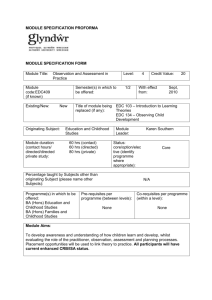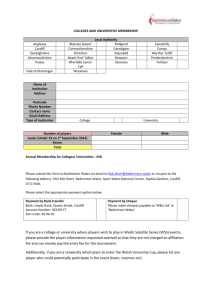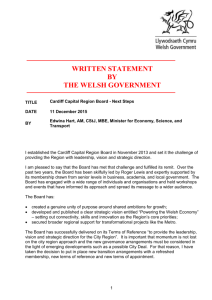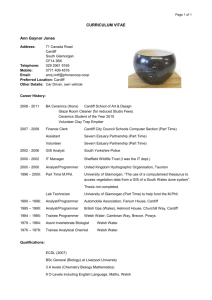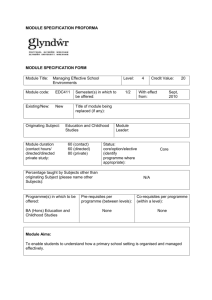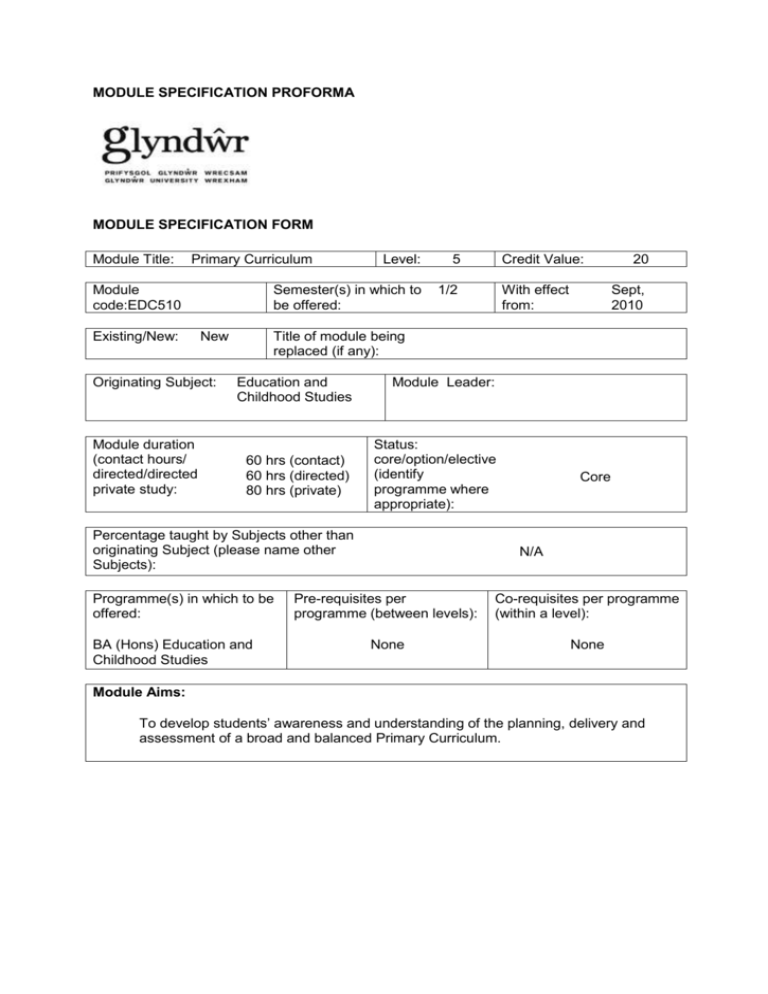
MODULE SPECIFICATION PROFORMA
MODULE SPECIFICATION FORM
Module Title:
Primary Curriculum
Module
code:EDC510
Existing/New:
New
Originating Subject:
Module duration
(contact hours/
directed/directed
private study:
Level:
5
Semester(s) in which to
be offered:
1/2
Credit Value:
With effect
from:
20
Sept,
2010
Title of module being
replaced (if any):
Education and
Childhood Studies
60 hrs (contact)
60 hrs (directed)
80 hrs (private)
Module Leader:
Status:
core/option/elective
(identify
programme where
appropriate):
Percentage taught by Subjects other than
originating Subject (please name other
Subjects):
Programme(s) in which to be
offered:
BA (Hons) Education and
Childhood Studies
Core
N/A
Pre-requisites per
programme (between levels):
Co-requisites per programme
(within a level):
None
None
Module Aims:
To develop students’ awareness and understanding of the planning, delivery and
assessment of a broad and balanced Primary Curriculum.
Expected Learning Outcomes
At the end of this module, students should be able to:
Knowledge and Understanding:
1. Identify and critically discuss key concepts, topics, policy documents and theory that
underpin the primary curricula;
Examine and critically discuss different learning and teaching strategies relevant to
the planning, delivery and assessment of the primary curriculum;
Examine how effective planning can utilise a range of activities and resources within
the indoor and outdoor environments to enhance children’s learning;
Discuss and evaluate the necessary personal and practical skills for managing the
learning and teaching process;
Reflect upon own views and experiences of the primary curricula in practice.
2.
3.
4.
5.
Transferable/Key Skills and other attributes:
Planning, organisation and time management;
Evaluation and reflection;
Communication;
Sharing ideas;
Create and use resources/activities;
Listening;
Confidentiality;
Improving own learning and performance;
Analytical and problem solving skills;
Working with others.
Assessment: please indicate the type(s) of assessment (eg examination, oral, coursework,
project) and the weighting of each (%). Details of indicative assessment tasks must be
included.
Students will complete a reflective portfolio which will include the development, planning and
resourcing of a broad and balanced curriculum. The portfolio will include justification for the
approach taken; demonstrate a holistic, inclusive, active opportunity to further development
using both the indoor and outdoor environment and a reflection on personal and professional
development during the process.
Assessment
1
Learning
Outcomes
to be met
All
Type of assessment
Reflective portfolio
Weighting
100%
Word count or
equivalent if
appropriate
c4,000
Learning and Teaching Strategies:
The learning and teaching strategies will employ a range of methods, including lead lectures,
tutorials, workshops, small and large group activities and directed tasks. The module content
will be delivered by a small team offering ‘specialist subject’ input and support covering the
curriculum areas within the primary curriculum. Peer group and individual discussion will
allow the tutor to monitor student’s ability to reflect upon and evaluate their own ideas and
practice via discussion groups and individual tutorials.
Syllabus outline:
Explore the range of skills and knowledge which can be used when working with
learners and how to provide support for foundation subject development in
educational settings
Statutory requirements and structure for the planning, delivery and assessment of
different curricula (e.g. Foundation Phase/Stage; National Curriculum for Key Stages
1, 2 and 3)
Discussion of core and non-core curricular areas
Evaluate the strategies and techniques for supporting and assessing the effective
development of bilingualism and the Cwricwlwm Cymreig
Review and analyse the ways in which learner’s understanding is developed through
a broad and balanced curriculum
Understand the importance of the links between assessment and the curriculum and
the ways of assessing learner’s development
Identify ways in which individual learner’s learning and development can be supported
Recognise the importance of a broad and balanced curriculum and its contribution to
the holistic development of the child
Interpret and evaluate legislation, policy and guidance documents relating to primary
curricula in order to make links between theory and practice
All areas of learning outlined in policy guidance
Child centred active approach to learning to include learning through experience,
investigation and enquiry
Planning, delivery, evaluation and assessment of a range of activities as part of a
reflective cycle / process
Working with others (e.g. parents and other agencies) and as part of team to plan,
deliver and assess the primary curricula
Care of the environment (i.e. recycling and sustainability)
Practical skills related to the organisation, planning, resourcing and communication of
the primary curricula designed to support the development of children
Bibliography
Essential Reading:
Department for Children, Education, Lifelong Learning and Skills, (2008), Framework for
Children’s Learning for 3 to 7-year-olds in Wales. Cardiff: Welsh Assembly Government.
Department for Children, Education, Lifelong Learning and Skills, (2008), Making the Most
of Learning: Implementing the Revised Curriculum. Cardiff: Welsh Assembly Government.
Department for Children, Education, Lifelong Learning and Skills, (2008), Learning and
Teaching Pedagogy. Cardiff: Welsh Assembly Government.
Department for Children, Education, Lifelong Learning and Skills (2008), Skills Framework for
3 to 19-year-olds in Wales. Cardiff: Welsh Assembly Government.
Department for Children, Schools and Families (2008), Statutory Framework for the Early
Years Foundation Stage: Setting the Standards for Learning, Development and Care for
Children from Birth to Five. Revised Edition. Annesley: DCSF Publications.
Department for Education and Skills (2003), Every Child Matters. London: Department for
Education and Skills.
Department for Education and Skills (2006), Primary Framework for Literacy and
Mathematics. Suffolk: DfES.
Department for Education and Skills (2007), Practice Guidance for the Learning,
Development and Care for Children from Birth to Five. Annesley: DfES Publications.
QCDA (2010), The National Curriculum Primary Handbook. Coventry: QCDA.
Welsh Assembly Government (2004), Children and Young People: Rights to Action. Cardiff:
Welsh Assembly Government.
Welsh Assembly Government (2006), the Learning Country 2: Delivering the Promise.
Cardiff: Welsh Assembly Government.
Recommended Reading:
Arthur, J., Grainger, T and Wray, D. (eds), (2006), Learning to Teach in the Primary
School. Oxon: Routledge.
Cheminais, R. (2009), Effective Multi-Agency Partnerships: Putting Every Child Matters into
Practice. London: Sage Publication Ltd
Department for Children, Schools and Families (2009), The Independent Review of the
Primary Curriculum: Final Report. Nottingham: DCSF Publications.
Department for Children, Education, Lifelong Learning and Skills (2008), Observing Children.
Cardiff: Welsh Assembly Government.
Department for Children, Education, Lifelong Learning and Skills (2008), Play/Active
Learning. Overview for 3 to 7 - year - olds. Cardiff: Welsh Assembly Government.
Department for Children, Education, Lifelong Learning and Skills (2008), English in the
National Curriculum for Wales. Cardiff: WAG Publications.
Department for Children, Schools and Families (2009), The National Strategies Early Years.
Learning, Playing and Interacting. Good Practice in the Early Years Foundation Stage.
Annesley: DCSF Publications.
DfEE (2000), Working with Teaching Assistants – A Good Practice Guide. London: DfEE
National Assembly for Wales. (2002) The Learning Country. Cardiff: NAW
Doherty, J. and Hughes, M. (2009), Child Development: Theory and Practice 0 – 11. Harlow:
Pearson Longman
Fitzgerald, D. and Kay, F. (2008), Working Together in Children’s Services. Oxon: David
Fulton Publishers.
Grigg, R. (2009), Becoming an Outstanding Primary School Teacher. London: Longman.
Knowles, G. (ed), (2006), Supporting Inclusive Practice. London: David Fulton.
Riley, J. (2003), (ed.), Learning in the Early Years: A Guide for Teachers of Children 3 – 7.
Second Edition. London: Paul Chapman Publishing.
Watkinson A. (2003), Professional Values and Practice: The Essential Guide for Higher Level
Teaching Assistants London: David Fulton.
Useful websites:
www.bbc.co.uk/education
www.becta.org.uk
www.clpe.co.uk/
www.estyn.gov.uk
www.nationalstrategies.standards.dcsf.gov.uk
www.nationalstrategies.standards.dcsf.gov.uk/earlyyears
www.ngfl.gov.uk- National Grid for Learning
www.ofsted.gov.uk/reports
www.ngfl-cymru.org.uk/
www.nrich.maths.org/primary
www.nate.org.uk/site/publications/index.php
www.oup.co.uk/oxed/primary/
www.standards.dfes.gov.uk/primary/literacy/
www.tda.gov.uk
www. vtccymru.ngfl.wales.gov.uk-Virtual Teachers’ Centre for Wales
www.wales.gov.uk/topics/educationandskills/curriculumassessment/arevisedcurriculumforwal
es/foundationphase/?lang=en
Please note: Additional ‘subject specific’ reading material will be recommended by individual
specialist tutors during seminars.

